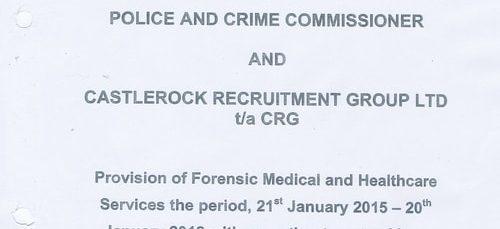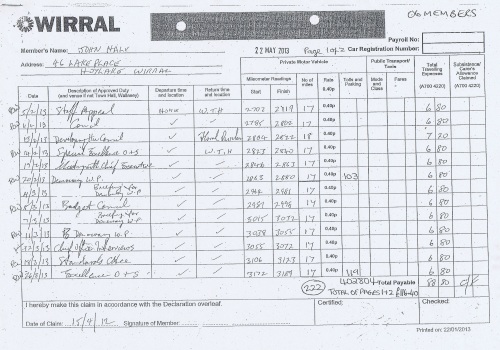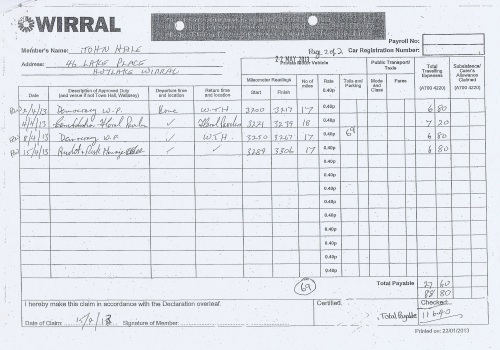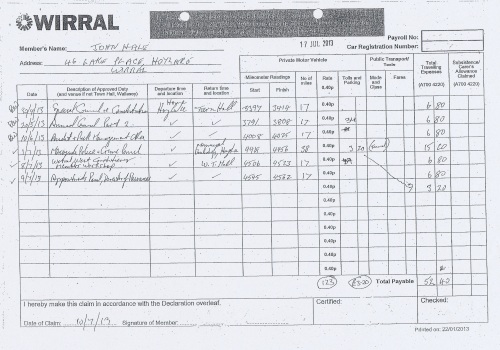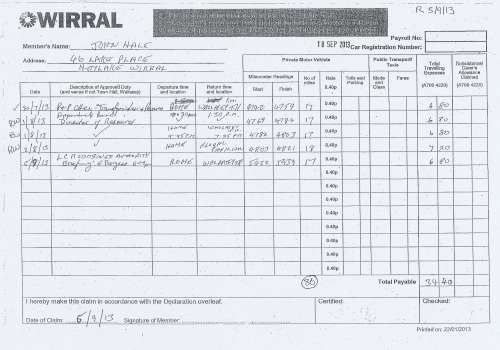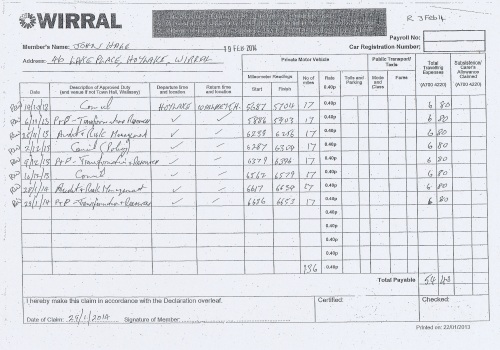What’s in a ~500 page contract between the Police and Crime Commissioner for Merseyside and CRG for a private company to provide detained persons and officers healthcare and medical services?
I have a big red box file in my office.
What’s in the box you may ask?
Here’s a sample.
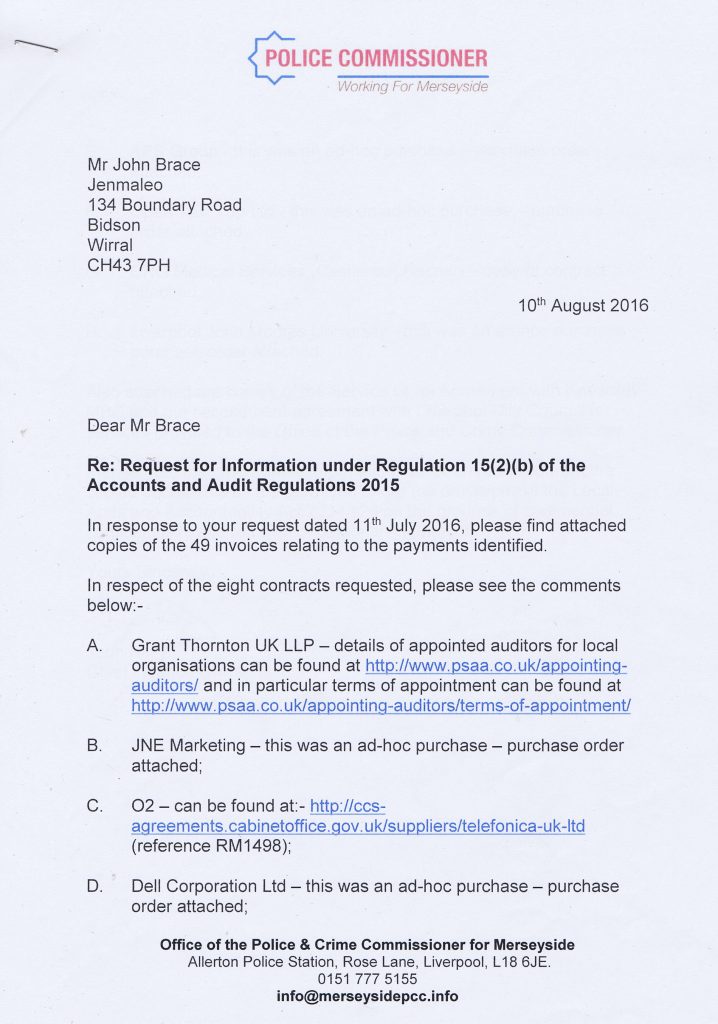
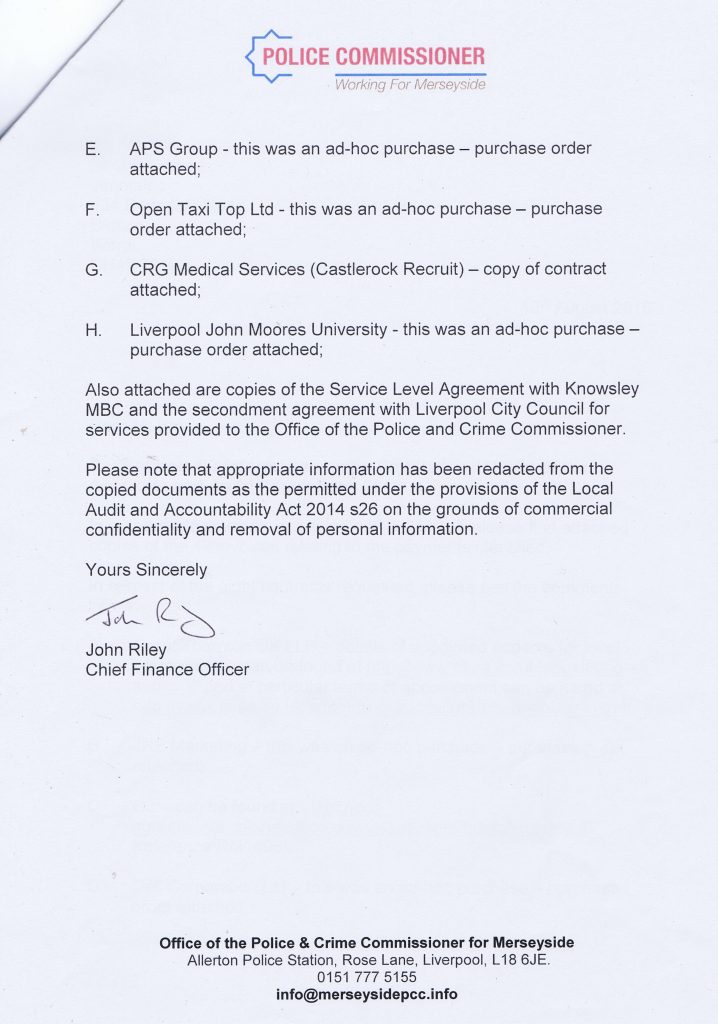
Well it’s the result of my citizen audit of the Police and Crime Commissioner for Merseyside for the financial year 2015-16.
Just to show how long I’ve been a journalist for, you will find on this blog reports of public meetings of the Merseyside Police Authority. A few years ago the coalition government abolished the Merseyside Police Authority and replaced it with the Office of the Police and Crime Commissioner for Merseyside.
In the box are copies of 49 invoices and details of 10 contracts.
The largest contract at ~500 pages is a contract between the Police and Crime Commissioner and Castlerock Recruitment Group LTD t/a CRG for the “Provision of Forensic Medical and Healthcare Services for the period, 21st January 2015 – 20th January 2017 with an option to extend by a further 2 years.“ which is reference PCCM / PD / 026 – Bluelight ref. 9KBD-BXVLMV .
This is perhaps the most interesting document although like many of the documents is redacted in part.
There’s also a service level agreement with Knowsley Metropolitan Borough Council and a secondment agreement with Liverpool City Council.
Some of the redactions were later challenged by myself and the Office of the Police and Crime Commissioner agreed with me that they didn’t have a legal basis to do so and released further information.
It is somewhat strange however that myself a journalist seems to have a better knowledge (from a legal perspective) over what can be redacted than the Office of the Police and Crime Commissioner. However I shouldn’t be too harsh on the OPCC for Merseyside as legal advice is a matter contracted under a SLA out to Knowsley Council (but don’t get me started on Knowsley Council and flawed legal advice!)
However the public sector as a whole has a tendency to for want of an expression take the mickey with me over redactions.
Although thankfully I rarely have to involve the judiciary in such matters.
Anyway going back to the large contract, due to its size from a time element it would take some considerable time to scan in, resize, compress and publish on the blog.
Those of a more political bent, may point out that in the public sector paying a private company for medical and healthcare services, that this falls into the political arguments over whether public services should be provided by the public sector. If provided by the private sector, ultimately less is spent on the service as a proportion ends up in profit (and presumably a different amount in taxes). For example 20% of all the money spent on CRG goes on VAT.
However, from CRG‘s last published accounts for 2015-16, they have a turnover of £34.3 million with a gross profit of 23.1%.
So out of £100 spent by the public sector with CRG, I estimate £16.69 will go on VAT, £23.10 on profit, leaving ~£60 out of every £100 on providing a service.
The contract is signed by Jane Kennedy (the Police and Crime Commissioner for Merseyside) and Laura Hale (a director of Castlerock Recruitment Group Limited).
Moving on to the Pre-Qualification Questionnaire it states that it’s for the provision of forensic and healthcare services (excluding SARCS).
SARC refers to Sexual Assault Referral Centre.
It explains that police forces and NHS Local Area Teams are working towards the transfer of commissioning responsibility for healthcare in police custody from the Home Office to the Department of Health and that the work of these Police/NHS Partnerships sits within the National Police Transition Programme.
If this happens during the life of the contract it is anticipated that the commissioning authority changes from Merseyside Police to the NHS England Lancashire Area Team and the contract will be novated.
However police forces and the NHS share contract governance, even after this change. This is done through the Strategic Healthcare Joint Partnership Board, at the time chaired by Chief Superintendant Carl Krueger, with representatives from NHS England Lancashire Area Team and NHS England (Merseyside).
PCC in the contract refers to the Police and Crime Commissioner for Merseyside.
The background explains that Merseyside Police was formed in 1974, serves a population of ~1.5 million people, covering an area of 647 sq km and five Metropolitan Borough Areas (Liverpool, Sefton, Knowsley, St Helens and Wirral).
It then describes the BCUs (Basic Command Units) in operation at the time, which was one for each borough except Liverpool split into two.
The contract refers to the three universities, two premiership football teams (Tranmere Rovers doesn’t get a mention or maybe its fans are better behaved), a rugby league team and two major racecourses. It states that in 2013, Liverpool received 57 million visitors to the region (referring to tourism). At the time of writing Merseyside Police employed over 6,000 people (*although technically police officers aren’t employees but officers of the Crown) ranging from police officers, PCSOs, support staff, Special Constabulary Officers and volunteers).
The custody suites are listed as follows (five in total) with 131 cells. There are also two mothballed custody suites which can be opened for pre-planned events and operations (which is an extra 32 cells).
Here is the list in the following format
location – BCU – Cells – Current operation
St Anne Street – Liverpool – 33 – 24/7
Wavertree – Liverpool – 20 – 24/7
Copy Lane – Sefton – 24 – 24/7
Wirral – 32 – 24/7
St Helens – 22 – 24/7 (Mothballing or reduced opening hours are currently being considered for this suite)
Southport – 12 – Mothballed
Belle Vale – South Liverpool – Mothballed
The contract states that services at the time of the contract award were provided by Medacs Healthcare (contact details Helen Kelly (Director of Managed Healthcare)) and that staff employed by Medacs may need to be TUPEd over to the new provider.
There is a list of how many detainees there are for each month from April 2013-14, how many calls there were for a healthcare professional, along with a percentage of HCP calls vs No of detainees.
The total number of detainees varies from 3,510 in April to 3,927 in July. The number of HCP calls varies from 1,698 in March to 2,217 in July. The percentage varies from 46.3% in March to 56.5% in July.
There is then a table for December 2013 of various categories of call out, split by custody suite location with totals.
For example one of the categories, category 6 is Death (All) of which there were 4 in December 2013. This is 4 out of a total of 2,011 calls for a healthcare professional.
The six major categories (all with totals over 100 call outs in that month across Merseyside) in order of calls were:
Injuries (All) – inc Officer Injury,
Fitness to – Detain, Interview, Release, Court, Travel etc,
Medication Administer / Review,
Drink / Drug Withdrawl,
Reassessment / Mental Health Reassessment,
Detainee’s Request / Complaint against police
There were also 27 listed as Taser Removal / self harm / suicide risk.
Below are the first pages of the contract that I’m referring to. Are people interested in the rest or is police officer healthcare and detained persons’ healthcare an issue you assumed was provided by the NHS?
Just to be clear, these pages are published relating to rights in the Re-Use of Public Sector Information Regulations 2015, Accounts and Audit Regulations 2015, Data Protection Act 1998 and Local Audit and Accountability Act 2014.
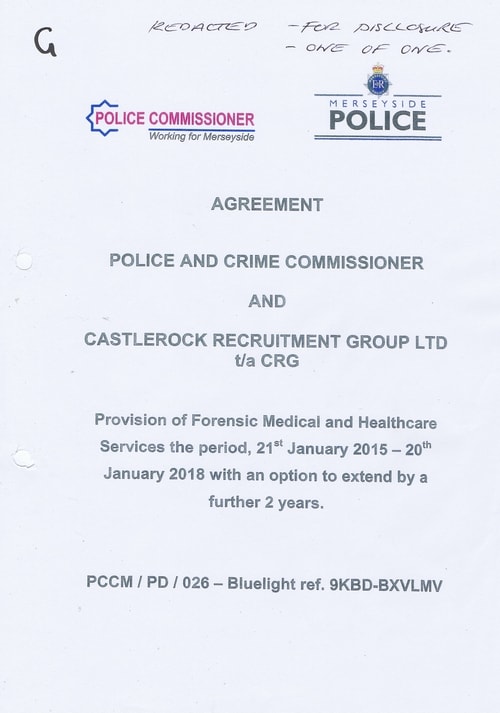
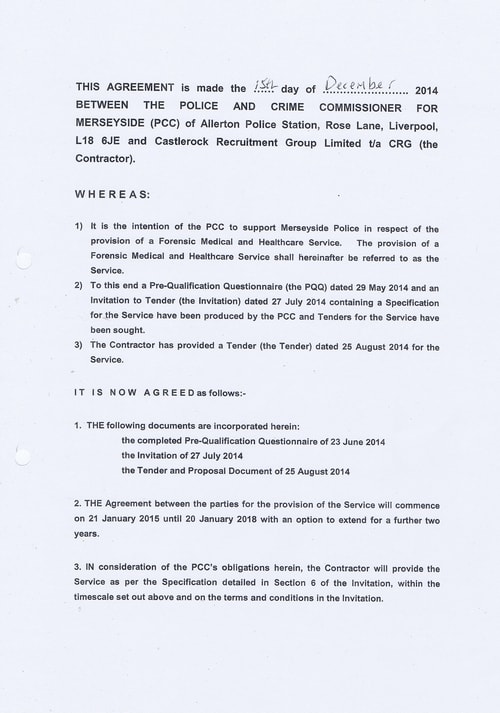
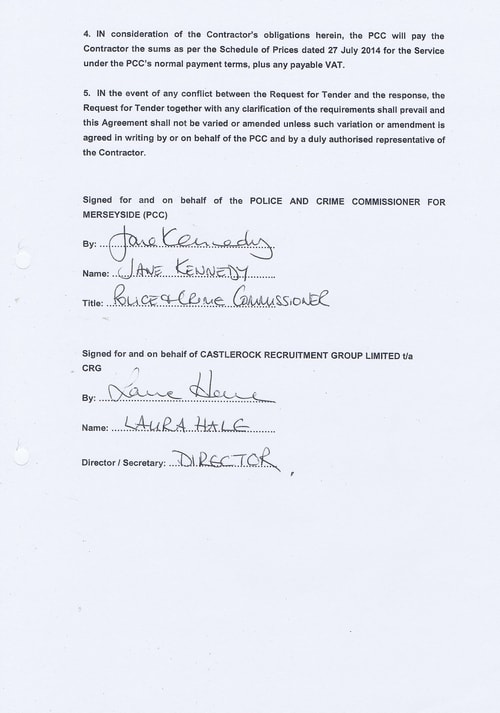
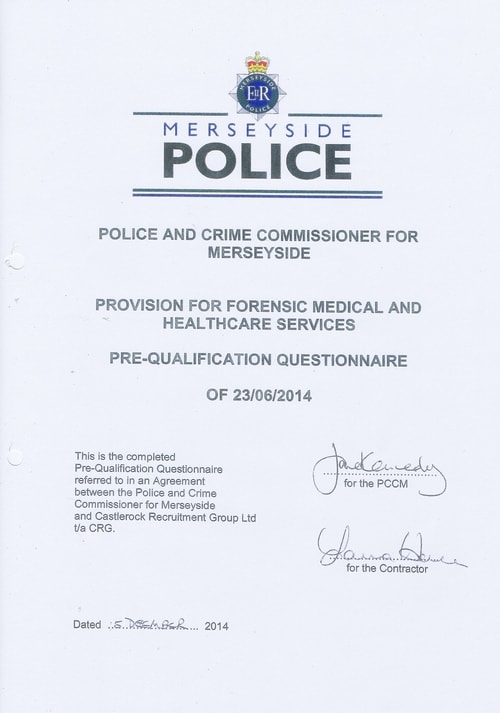

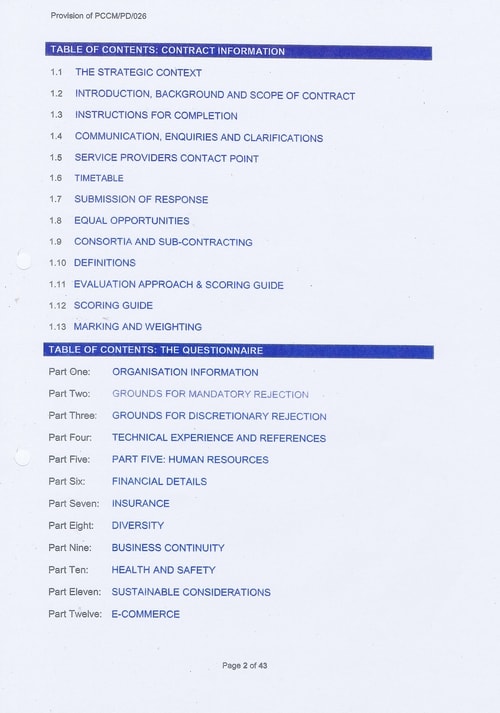
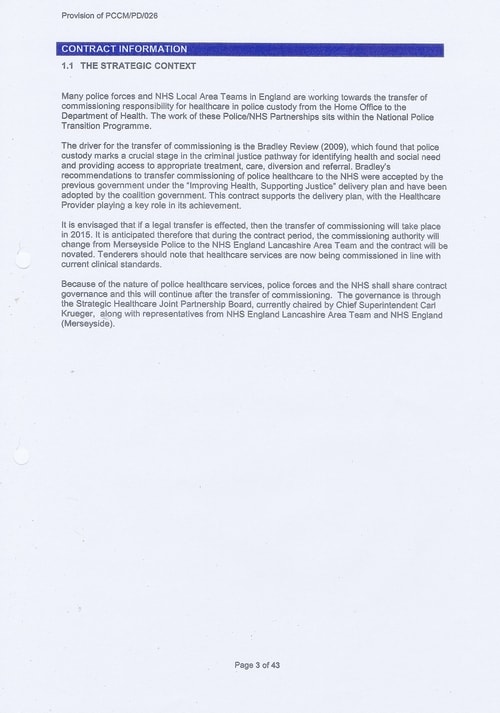
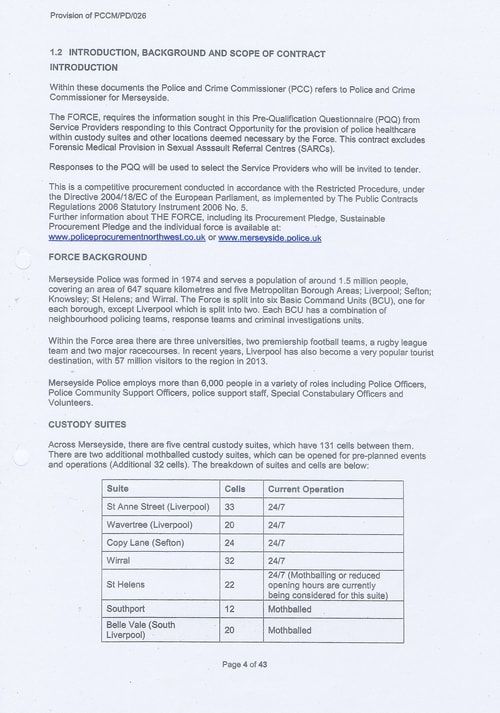
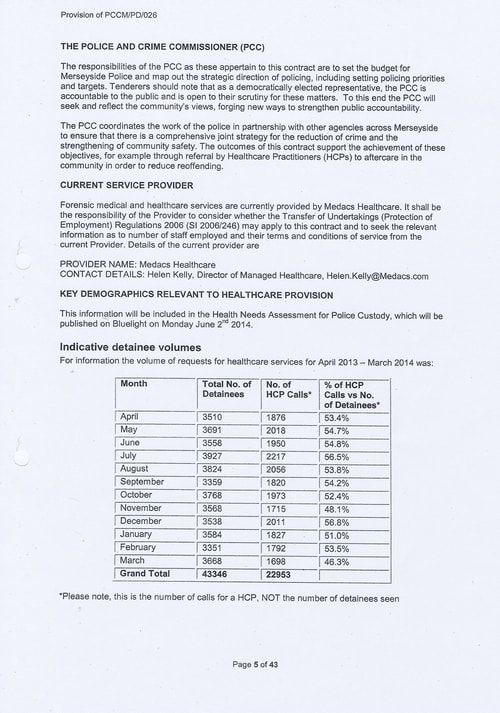
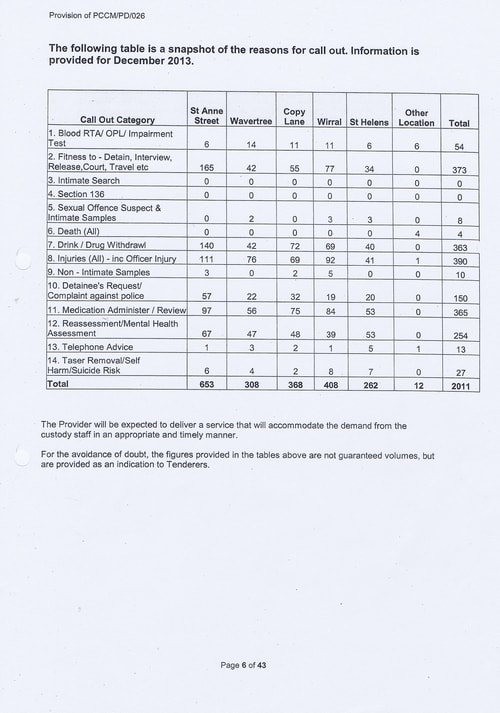
If you click on any of the buttons below, you’ll be doing me a favour by sharing this article with other people.
